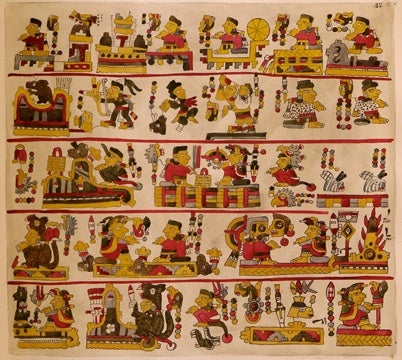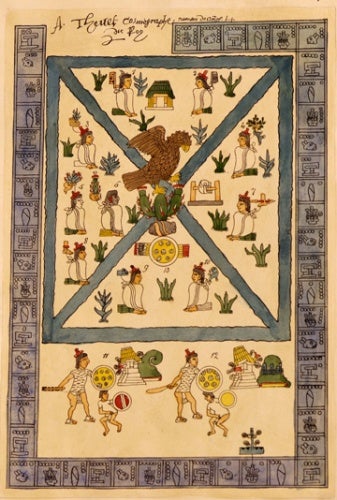
A page from the Codex Bodley, an early 16th century Mixtec manuscript held by the Bodleian Library at Oxford

A page from the Codex Mendoza, depicting the history of Tenochtitlan (or Mexico City) from 1325 to 1375. The original Aztec codex is also housed at the Bodleian Library.
To learn more about the Kingsborough book and codices from the libraries' special collections, read Dan Knapp's article from the Chronicle:
Antiquities of Mexico
While studying at Oxford in the early nineteenth-century, Edward King—more commonly known as Lord Kingsborough—became intrigued by the fragile early books of the Aztec and Maya known as Mexican codices in the university’s Bodleian Library.
Kingsborough was convinced that these rare materials scattered throughout European libraries and museums contained evidence that the Mayan, Aztec and Mixtec peoples of Central America were a Lost Tribe of Israel. To prove his hypothesis, he spent years and considerable financial resources commissioning artists to reproduce the Meso-American codices and those collected by European institutions.
“These early books were usually on folded screens made of bark paper or animal skin,” explained USC Librarian Barbara Robinson. “In the 20th century scholars have decoded the content of the codices, which have been discovered to include genealogical, historical and calendrical information, for religious and agricultural purposes.”
In 1831, Kingsborough printed—at his own expense—the first volume in a set of nine folio-sized books known as Antiquities of Mexico which contained reproductions of many of the important codices and manuscripts that documented pre-Columbian Mexico.
The publication of the subsequent volumes exhausted Kingsborough’s fortune and landed the nobleman in a debtor’s prison. The set’s two final volumes were posthumously published after Kingsborough’s death in 1837.
Antiquities of Mexico provide researchers with information about Meso-American civilizations between the years 690 and 1520, just prior to the Spanish conquest of Mexico.
The first three volumes of Antiquities of Mexico were donated to USC in 1985 by Herbert and Jane Boeckmann. The books were among the donation of 80,000 items that led to the creation of USC’s Boeckmann Center for Iberian and Latin American Studies.The USC Libraries’ three volumes are particularly intriguing to scholars because they contain the rarer hand-painted watercolor reproductions of the codices. In addition to Antiquities of Mexico, the Boeckmann Center holds several hundred facsimiles of important codices in its collection.
To schedule an appointment to view the Antiquities of Mexico or to learn more about the Boeckmann Center, call (213) 821-2261 or e-mail Robinson at brobinso@usc.edu.